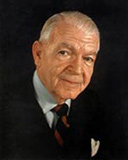Albert Ross Tilley, CM OBE was a Canadian plastic surgeon who pioneered the treatment of burned airmen during Second World War. Tilley was born in Bowmanville, Ontario and graduated from the University of Toronto in 1929.
He opened a private practice in Toronto at the Toronto Western and Wellesley hospitals in 1935, and was one of the first physicians in Canada to train in plastic surgery. A member of the Canadian Army Medical Corps Militia, he was transferred to the Royal Canadian Air Force (RCAF) Medical Branch at the start of the Second World War and became the Principal Medical Officer in 1941. In 1942, he worked at the Queen Victoria Hospital with Archibald McIndoe where burned airmen were treated. The patients called themselves the Guinea Pig Club. He was made an Officer of the Order of the British Empire in 1944 and was discharged from the RCAF with the rank of Group Captain in 1945.
After the war, he returned to his practice in Toronto and Kingston, Ontario, where he was an assistant professor of surgery. Dr. Tilley was the first to teach plastic surgery at Queen’s University. He was a charter member and a past president of the Canadian Society of Plastic Surgeons.
In 1981, he was made a Member of the Order of Canada. In 1982, he was made an honorary member of the Canadian Medical Association. In 2006, he was inducted into Canada’s Aviation Hall of Fame for “his exceptional skills and radical new medical techniques, his total devotion to the treatment of airmen’s burns and reconstruction of deformities, his understanding of the need to treat both the body and the spirit, giving his patients the will and ability to reintegrate into society, have benefited Canada and the world.”
Dr. Ross Tilley envisioned an adult burn treatment centre in the Toronto area and launched an intensive campaign, led by Drs. W.R.N. Lindsay, Leith Douglas and Tilley himself in the late 1970’s and early 1980’s. Their efforts, combined with the enthusiastic committee of the board of Wellesley Hospital, convinced the Ministry of Health that the concept was valid. Their successful campaign led to the building of the original burn centre in The Wellesley Hospital, which was named in honour of Dr. Ross Tilley for his work and dedication in this field. The Ross Tilley Burn Centre officially opened on April 18, 1984 and was under the directorship of Dr. Walter J. Peters. In 1998, as part of healthcare restructuring, the Ross Tilley Burn Centre became part of Sunnybrook Health Sciences Centre and transferred from The Wellesley Central site of St. Michaels’ Hospital to the Sunnybrook campus in December of that year. His name remains as a reminder to the rich heritage and pedigree of burn care at this university.
The Dr. Ross Tilley Public School and the Dr. Ross Tilley YMCA and Day Care Centre in Bowmanville, Ontario, and the Ross Tilley Ward in the Queen Victoria Hospital, East Grinstead, are all named in his honour.
http://en.wikipedia.org/wiki/Albert_Ross_Tilley
WWII Plastic & Reconstructive Surgery
Memorabilia from Dr. A. Ross Tilley
Special thanks to Dr. John Robert Taylor for collecting and preserving this historical memorabilia from World War II. The artifacts collected showcases Dr. E. Fulton Risdon, Dr. A. Ross Tilley and Dr. William D. Butt’s crucial contributions to plastic and reconstructive surgery during that era. The Division of Plastic, Reconstructive & Aesthetic Surgery at the University of Toronto is forever grateful to these pioneers who have changed the lives of many.





















































































































































